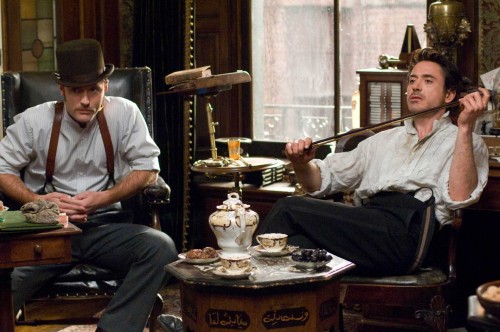Sherlock Holmes
It was _____, In the Study, With Black Magic

Starring: Robert Downey Jr., Jude Law
By Tom Bevis
Ladies and gentleman, Guy Ritchie has gone Hollywood, and his latest offering, Sherlock Holmes, is bleeding proof. The film boasts an undeniably mainstream cast, lead by one of America’s biggest stars today: Robert Downey, Jr. And the costar? Big-budget special effects, of course, things like explosions, bare-knuckle fist fights, a partially-constructed steamship on a clumsy rampage, and other such visual niceties. But when dealing with one of the world’s most beloved literary properties, how can Ritchie and his tight-pressed Hollywood friends keep up?
Looking at the character of Sherlock Holmes and his world as a leman, the film will be readily enjoyable, given the release of the character’s established canon. Readers of Arthur Conan Doyle’s works will likely sneer at the various interruptions of the Holmes continuity (ranging from the appearance of Professor Moriarty, the return of Irene Adler, the retirement of Dr. Watson from Holmes’ service and etcetera), however. But discarding these as mere Hollywood inaccuracies (every movie has them somewhere), the picture is actually quite enjoyable.
I admit that I was skeptical of Guy Ritchie’s ability to direct this picture. Sure, all of his films revolve around, essentially, a central mystery or dilemma, but they are also, by-and-large, action-oriented. Sherlock Holmes, on the other hand, was always the epitome of the brains-over-brawn mindset. Now, I’ll give you all a few seconds to scroll down and post a comment scolding me for this remark, as, surely, you’ve been out reading interviews with Guy Ritchie and his producers which tout Holmes as “the world’s first action hero.”
Finished?
Good, let me continue.
While it is often implied in Doyle’s work that Holmes has certain prowess with such means of physical combat as swordplay and martial arts, he rarely uses those skills to achieve his goals in the present-text of the stories. I can only assume that it’s common for directors and producers to grab onto little implications like this and use them to morph the base material into the subject that they want to see. I mean, we’ve all seen Zack Snyder’s Watchmen by now, haven’t we?
However, my worries were wiped away early in the film, when seeing Ritchie’s unique manner of showing on-screen Holmes’ power of deduction. This was used, of course, in the course of combat, but the effect was still powerful. The scene slows down, carried by Downey’s open narration of the deduction as the action on screen follows. Once it’s through, the scene clicks back into place and we see fully and at standard speed the result of Holmes’ intellect. Quite simply, no one could have done this better than Guy Ritchie, and that’s why he was perfectly suited for the film, if not slightly ignorant of his source material.
The characters themselves faced the break-and-bend sway of Hollywood. This is most apparent in the Sherlock Holmes character which is portrayed more closely as a vehicle to perpetuate Downey’s public image than to hold true to the character itself. However, Downey plays his role well and makes an engaging study of it, playing the joker to Law’s straight man. Law, in fact, outshines Downey and tends to maintain more power over the flow of the film. His character his built more delicately and accurately and he doesn’t fall into the usual public-conceived notions of his screen persona.
Rachel McAdams performs her role admirably as the Holmes’ love interest, although her function in the film was almost entirely pointless, other than to set up the possibility of a sequel. The film also lacks much of Ritchie’s usual cast. In fact, unless I’m mistaken, Mark Strong is the only one of Ritchie’s usual casters present in the film. I guess the general public just weren’t buying into the aspect of Jason Statham as the great detective.
The film is an entirely capable and adequate mystery that follows Holmes and Watson as they attempt to piece everything together before a catastrophic prophecy is fulfilled. The story weaves in-and-out of Holmes’ personal life, from his relationships with Watson and Irene Adler, to the quality of his life and the status of his employment, bringing the character to light as the subject and not just the means of the picture.
Ritchie paces the film beautifully, building and dropping clues seamlessly, sending Holmes and his companions this way and that, building a suspense that is almost dizzying. It handles itself well as both a mystery, however, and an effective action film. Ritchie utilizes the perfect marriage of story and action to craft his unique manner of moving a plot along naturally, instead of using action and violence as a jaunty mechanism to force the story where he thinks it should be going.
Indeed, if the audience is willing to ignore the existing canonized thread of Sherlock Holmes’ adventure, and the Guy Ritchie fans are willing to lay aside the director’s sudden changes in style to accommodate a more Hollywood-friendly feature, then the picture is sure to be a holiday hit. If anything, the big Hollywood cast and massive special effects will prepare Ritchie for his upcoming DC Comics adaptation of Lobo.
4/5
